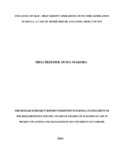| dc.description.abstract | A growing number of people in various parts of Kenya belong to self-help groups. Through these groups, members actively engage in savings and credit, income generating activities, natural resource management, child care, nutrition and literacy and even collective bargaining for rights and priviledges.The aim of this study was to determine the influence of self-help groups operations’ on income generation in Kenya by studying self-help groups in Michii Mikuru location, Tigania East Sub County, Meru. The study was based on four independent variables and one dependent variable. The study was founded on four main objectives as follows: to determine the influence of business skills training on income generation by the self-help group members at Michii Mikuru location, to describe the contribution of income generating projects on income generation by self-help group members at Michii Mikuru location, to evaluate the influence of credit access by the self-help group members at Michii Mikuru location on income generation, and to assess the influence of intragroup conflict resolution on income generation by the self-help group members at Michii Mikuru location. An overview of literature review was centred on the variables which are training of self – help groups on business skills, credit access by members of self-help groups, ownership of income generating projects by groups and individuals, intragroup conflict resolution, and income generation by the group members. The key theme of the literature review was how the operations of the self-help groups presented as the independent variables, influence income generation by the self-help group members. In this study, descriptive survey design was applied. The study was descriptive in nature and aimed to explain the relationship of the variables using both qualitative and quantitative paradigms. Therefore, data collected was both qualitative and quantitative in nature. The target population were the self-help group members that belonged to groups that were formed between May 2009 and May 2012 at Michii Mikuru location in Tigania East Sub County. Based on this criteria, the total number of groups targeted were 64, each with an average of 20 members, making a total of 1,280 self-help group members. Probability sampling methods were used for getting 15 self – help groups and 48 self-help group members as the representative samples for this study. The key aspect of reliability that applied in this study was stability. Data was collected using the structured interview method and the questionnaire. Data analysis was done using descriptive analysis techniques and inferential statistics. The estimation of Spearman’s correlation between the independent variables and the dependent variables and testing of the z statistic revealed negative correlation between training of the self – help groups on business skills and income generation, positive correlation between ownership of income generating projects and income generation and lastly, a negative correlation between access to credit and income generation. The study recommends that the organization promoting the formation of groups at Michii Mikuru location should enhance its networking and collaboration with the local national and county government agencies so that they (the agencies) play an active role in capacity building of the groups. This will also ensure sustainability | en_US |

